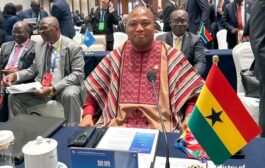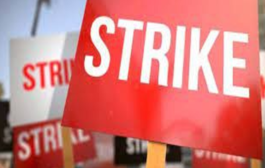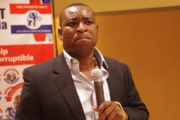The European Parliament is set to approve the terms of the UK’s departure from the EU in a historic vote later.
The 751 representatives will debate the Brexit Withdrawal Agreement in Brussels before, it is widely expected, giving their backing to the UK-EU treaty.
MEPs have been saying goodbye to their British counterparts, with some wearing “always united” scarves.
Wednesday’s vote is the final stage of the ratification process, ahead of the UK’s exit at 23:00 GMT on 31 January.
The UK participated in its last meeting as an EU member on Tuesday when Foreign Office minister Chris Pincher attended the General Affairs Council.
The European Parliament’s approval is the final hurdle to be cleared for Brexit to go ahead.
However, Wednesday’s session will be largely symbolic, featuring valedictory speeches and music. The outcome of the vote is not in any doubt after the Withdrawal Agreement was signed off by key parliamentary committees last week.
After the vote, scheduled to take place at about 1700 GMT, the UK MEPs leaving their jobs are expected to be serenaded by their colleagues in a special ceremony.
The proceedings will be an opportunity for those on either side of the Brexit battles of recent years, including the UK’s 73 MEPs, to celebrate or lament the end of the UK’s membership of the EU after 47 years.
The S&D coalition, which houses Labour’s ten MEPs, displayed a sign aimed at departing British members, which read: “It’s not goodbye, it’s au revoir.”
European Parliament President David Sassoli, also a member of the group, joined the group in a rendition of Auld Lang Syne.
On Tuesday evening, several MEPs in the Green group also held a ceremony to mark the UK’s departure.
The debate on October’s agreement, which includes among other things guarantees over the rights of EU nationals living in the UK and British ex-pats on the continent, will be opened by the Parliament’s Brexit spokesman Guy Verhofstadt.
Mr Verhofstadt, a former Belgian prime minister, has been one of Brexit’s strongest critics but last week he paid tribute to the UK’s MEPs, saying their “knowledge, energy and wit” would be missed.
Other prominent figures expected to speak include the UK’s Brexit Party leader Nigel Farage, who has been campaigning for the UK’s exit since before he was first elected to the Brussels Parliament in 1999.
Ahead of the vote, he told reporters he would miss being the assembly’s “pantomime villain,” but vowed his Brexit Party would not “vacate the battlefield”.
While Brexit Party MEPs spoke of their joy and relief at leaving, others shared messages of sadness on social media as they prepared to vote for the last time.
Liberal Democrats shared pictures of gifts from the pro-European Renew Europe group.
The Green Party’s Alexandra Phillips tweeted: “I’m devastated to be leaving the best job in the world. I get to make a real change every day while being surrounded by 27 different languages and cultures.” The EU’s negotiators have kept the European Parliament on board throughout the Brexit process.
Its main committees have given their approval. So it’s inevitable that the deal will be endorsed. Instead of a moment of jeopardy, this is likely to be the highest-profile event in the EU’s distinctly low-key goodbye to the UK.
Expect speeches that praise EU unity and describe the UK’s departure as a regrettable mistake. A German MEP is planning a sing-a-long to Auld Lang Syne. The SNP group have arranged for a piper to play them out of the building.
In the meantime, the 73 British members are packing their belongings into their regulation-issue 15 cardboard boxes.
The main send-off will happen on Friday when the president of the European Parliament will deliver a joint statement alongside the presidents of the European Council and the European Commission.
The British flag that flutters outside the parliamentary premises will be lowered in the early hours of Saturday morning before it’s displayed in a museum
After the UK leaves, there will be an 11-month transition period in which the two sides hope to negotiate their future economic relationship.
Trade talks are expected to begin in earnest in early March. The European Parliament will also get a say in ratifying any future trade deal.
The UK has insisted talks should not extend beyond 31 December 2020 when a transition period – which will see the UK follow EU rules – comes to an end.
President Sassoli told CNN on Tuesday that the timetable for a deal was tight.
He said the UK’s exit would be “painful” for the bloc but building a new partnership based upon friendly co-operation and mutual interests were now essential.
Source: BBC




















































